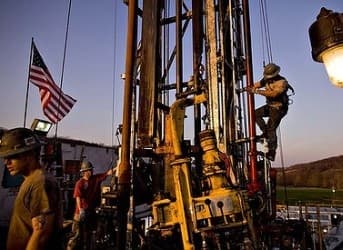A policy report from the scholars at The Brookings Institution finds that a surge in U.S. oil and natural gas production is a "bright spot" in the nation's economy. In December, the U.S. Energy Department noted that oil production was at its highest level in 15 years. For natural gas, the story is much the same given advancements in extraction technology. Because of this, the researchers at Brookings called on the White House to embrace the boom given lingering economic woes. Their recommendation on taxes, however, is likely to raise hackles from industry supporters.
President Barack Obama said his administration, during its second term, would take on the "long and sometimes difficult" task of ushering in an era where renewable energy resources will maintain the economic strength of the country in the coming years.
Critics of Obama's "all-of-the-above" energy policy have derided his administration for throwing up road blocks to oil and natural gas production. Groups like the American Petroleum Institute say the domestic oil and natural gas industry, not renewables, may help erase years of economic problems and "listless job creation."
Related Article: The Unexpected Boom in US Oil Production
In a late 2012 report, the U.S. Energy Department said that, as of September, the country was producing about 6.5 million barrels of oil per day, the largest amount in roughly 15 years. That was enough for scholars at Brookings to agree with API sentiments, saying the "one bright spot" for the United States was the oil and natural gas boom under way in the country. They point to growing energy demands from the vibrant Asian economies as a source for U.S. economic vitality. The United States, they say, could become the "principle beneficiary" of the economic expansion in countries like China and India by taking advantage of the boom. To exploit the opportunity, Brookings scholars called for the expedited permitting of oil and gas pipeline infrastructure to facilitate exports.
This week, Nebraska Gov. Dave Heineman issued a letter to the White House expressing his support for the Keystone XL pipeline. TransCanada's multibillion dollar project for Alberta oil sands has been touted as a panacea for U.S. economic woes. API states that Keystone XL would be a major economic stimulus, adding more than $11 million to Nebraska state and local revenues alone. Groups like pipeline opponent Bold Nebraska, however, say much of the potential benefits are hyped.
Related Article: EU Fears a US Shale Oil Boom could Make Competition Impossible
While the Brookings assessment notes that capitalizing on the oil and gas boom may offset a "massive" U.S. debt burden and "a dysfunctional political system," they offer a note of pragmatism by stating the United States will continue to import foreign oil for the foreseeable future. In a recommendation sure to upset the free-for-all economic disciples at API, Brookings scholars state that "obvious opposition" to the energy boom from environmental groups may be offset by the one thing many oil and gas advocates fear most -- more taxes.
"A policy of full-scale hydrocarbon development can be consistent with leadership on climate change if, as a strict condition of the rapid development and export of our oil, gas, and coal resources, the production of hydrocarbons is taxed."
ADVERTISEMENT
By. Daniel J. Graeber of Oilprice.com


















